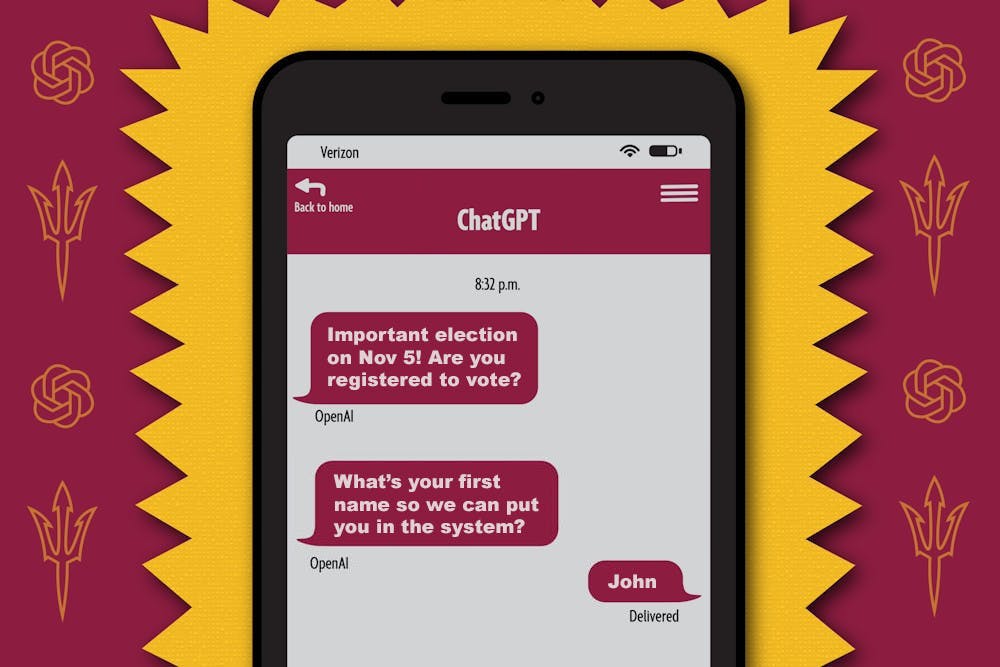Artificial intelligence is as revolutionary as computers were 30 years ago. Today, AI can curate personalized advertisements, chat with people online and even open the doors to convenient election information.
However, as the general election approaches and voters are getting more political information from online sources, concerns about misinformation have overshadowed some of the positive impacts of AI.
"(AI) provides us with a more logical perspective," said Tathagata Saha, a graduate student studying global business management and data science, and the president of the AI Club at Thunderbird.
Krisha Waghela, a graduate student studying computer science and the president of the AI Society club, said easy access to information is mostly due to AI algorithms' ability to filter content.
"AI significantly impacts the way we perceive things as far as personalization and filter bubbles," Waghela said. "AI algorithms analyze other behavior preferences or interactions to curate and present content that aligns with every interest."
Waghela said filter bubbles occur when AI algorithms show a user content that reinforces their interests or beliefs. This is often demonstrated with political content through "microtargeting," in which AI sorts through user data to send political messages that will resonate more with a person.
"AI is programmed in such a way that they will not say anything unnatural or inconvenient," said Saha.
Waghela said this can lead to problems with misinformation.
"AI is playing a dual role," Waghela said. "Because on one side, it is a powerful tool for spreading factual information (for) voters and ensuring people are informed about the critical election details. However, on the flip side, AI is also being leveraged to spread misinformation, distort public opinion and even manipulate voting behavior."
Mark Simpson, a political scientist and instructor at the College of Integrative Sciences and Arts, said some presidential campaigns have embraced the misinformation that AI can spread, using memes and deepfakes to reach voters.
"It's the Trump campaign that realizes this can be used, even if some of the information is dishonest, to generate excitement and support for Trump," Simpson said.
Simpson said as more campaigning moves to social media, the line between politics and entertainment can blur.
"It's more about mobilizing your voters and getting them excited to vote," said Simpson.
READ MORE: Gen Z's brat summer: How young voters are impacting presidential campaigns
One of the AI tools used on social media is bots. Waghela said bots can amplify misinforming posts, push certain political narratives and can exaggerate the support or opposition they have.
"Bots can enhance user engagement by providing quick responses and fostering interaction, which can be useful for customer service or community management," said Waghela. "But the negative would be that bots can also create an illusion of support."
READ MORE: Insight: AI, art and academics on a global university stage
Simpson said these bots can be accounts created in other countries to start political discourse. He also said it's hard for the government to combat this issue because they must find a balance between restricting freedom on social media and stopping the spread of misinformation.
Still, Simpson said that using social media and AI for campaigning is continuing to grow in popularity. One reason to adopt this strategy is to reach college students effectively.
"AI tools analyze social media and online discussions to gauge student sentiment and adjust campaign strategies accordingly," said Waghela.
She said this helps make sure more voters are informed, but the widespread use of AI may also come with challenges.
Saha said that as students depend less on their own thinking and more on AI, they may have trouble finding their own voices.
"In certain scenarios, you need to have a human thinking," Saha said. "The AI is lacking the context, the emotion and the impact because it's an AI."
Edited by George Headley, Sophia Ramirez and Natalia Jarrett.
Reach the reporter at pkfung@asu.edu and follow @FungPippa on X.
Like The State Press on Facebook and follow @statepress on X.
Pippa is a sophomore studying journalism and mass communication with minors in political science and German. This is her third semester with The State Press. She has also worked at Blaze Radio and the Los Alamos National Lab.




